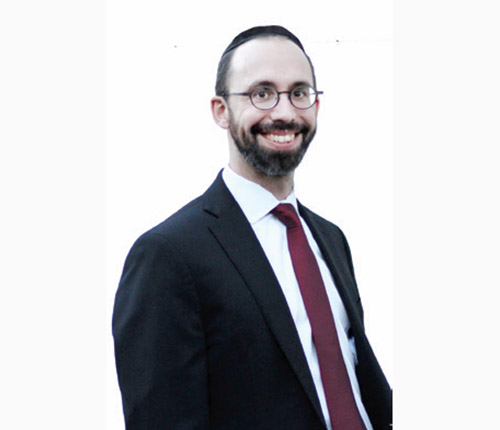
Russell Moskowitz grew up with very little knowledge about being Jewish. He was living the American dream, working at a nice job for Fuji Bank in the World Trade Center, on the 79th floor of 2 World Trade Center. In three days he would turn 25. He was making his mark at a young age. On Tuesday morning of September 11, 2001, he felt the giant tower shake…a little. People heard something about a plane hitting 1 WTC. No one panicked; it must have been an unfortunate accident. Yet suddenly a coworker on the floor came in yelling, “Everyone evacuate.” There were no PA announcements, so people were hesitant. In hindsight, that warning saved his life. Everyone headed toward the stairs to begin the very long trek down. As they reached the 44th floor, an announcement from the Port Authority came over the speakers. “There is a fire in building one, building two is secure. You may return to your desks.” Most began returning to work. Russell did not. He’s not sure what drove him on, but now thinks it was God pushing him forward. When he reached the 33rd floor, he heard the loudest sound of his life, felt the entire building shake, and fell to the floor. He now wondered if these would be his final moments. He remembered as a young boy in camp being told that people who are going to die recite the Shema. Russell kept repeating the first line of Shema over and over, praying he would live. He safely made it out of the building. He soon found out that the second plane had flown into the 79th floor, exactly where his office was located.
Russell was privileged to turn 25 that week, and the open miracles he saw on 9/11 prodded him to learn more about Torah and mitzvos. He now resides in New Jersey with his wife and four children. Russell took that powerful life event as a Divine message to connect to Hashem and now dedicates his free time to leaning Torah and helping others connect as well.
The first paragraph of the Shema is written in Parshas Va’eschanan. We say this fundamental prayer each morning, evening, at bedtime and in times of danger or fear of impending death. Orthodox Jews recite Shema about 80,000 times in a lifetime, but do we truly know its meaning? The words Shema Yisrael mean “Hear O’ Israel.” To whom are we talking? This line was first recited by the sons of Yaakov when they gathered around their father before he passed away. Yaakov was concerned that some of his children were not fully committed to Hashem, so they said in unison, “Listen Yisrael” (which is another name for Yaakov)—we all believe Hashem is our Hashem and He is one.”
Are we then speaking to Yaakov when we say the Shema? The Zohar says indeed we are referring to Yaakov, our grandfather who is in heaven, and we are affirming that we also are his children and 100 percent committed to Hashem, just as the 12 tribes were.
However, this translation is not what we see in most English siddurim. There, Shema implies we are addressing all Bnei Yisrael. This, too, begs an explanation. Shema is a personal acceptance of the sovereignty and absolute control of Hashem. Why are we addressing all Israel and making a public proclamation?
The answer is connected to a major question regarding the first paragraph of Shema. It says “V’ahavta es Hashem”—You shall love Hashem. But how can Hashem command us to have an emotion? How can we be ordered to love?
The Sifri says Hashem is commanding us to cause others to love Him, just like Avraham did in his time. The Rambam echoes this point and adds that when someone receives so much good from someone, it is only natural to tell others how special is that someone. If we really believe that Hashem gives us absolutely everything that we truly need and we recognize all the infinite kindness Hashem bestows upon us every minute, then we would not be able to contain ourselves! We would be shouting Hashem’s glory from the rooftops!
Russell took his life-changing experience and is using it to continuously become closer to Hashem and inspire others to do so as well. We do not need to have a near-death experience to appreciate the incredible kindness Hashem showers upon us. Let’s take stock of all our blessings and the everyday miracles that we and others constantly experience, recognize thereby how much Hashem loves us, and do our best to share this feeling with others each day.
By Rabbi Baruch Bodenheim
Rabbi Baruch Bodenheim is the associate rosh yeshiva of Passaic Torah Institute (PTI)/Yeshiva Ner Boruch. PTI has attracted people from all over northern New Jersey, including Teaneck, Bergenfield, Paramus, Rockaway and Fair Lawn. He initiated and continues to lead a multi-level Gemara learning program. Recently he has spread out beyond PTI to begin a weekly beis midrash program with in-depth chavrusa learning in Livingston and Springfield. This year he joined Heichal Hatorah in Teaneck as a Gemara iyun rebbe. His email is [email protected].













